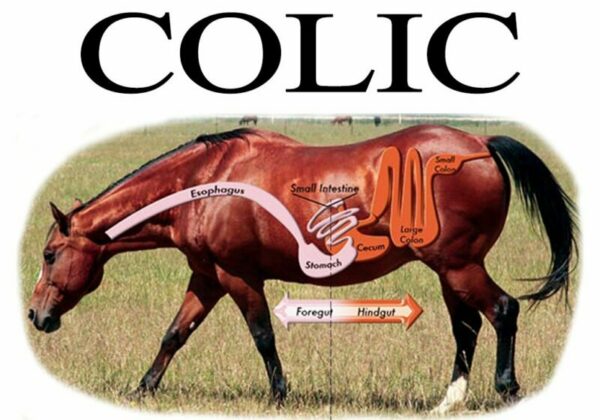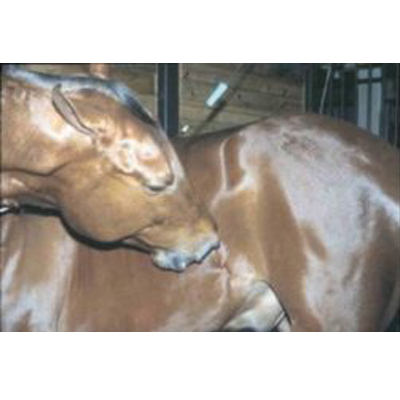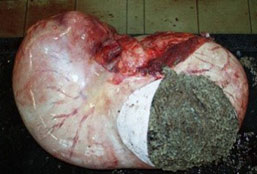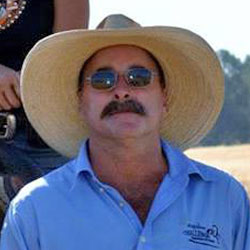Is It Colic Or A False Alarm? Colic In Horses. Sometimes you just can’t tell. Sometimes it’s a mild colic that doesn’t require a Vet even seeing the horse. Sometimes it’s as obvious as can be that something is wrong and a Vet needs to be called immediately. Sometimes the signs are so mild that you have no idea about the severity and it could be a problem that results in death if treatment is not sought right away.
Would you know what to do in each of these scenarios?
Symptoms and Types
There are various forms of equine colic. Most horses with this condition display some of the following symptoms:
- Anxiety or depression
- Pawing at the ground
- Looking and or biting at the flank
- Rolling or wanting to lie down
- Playing in the water bucket but not drinking
- Lack of defecation (manure)
- Lack of appetite
- Excessive sweating
- Abnormally high pulse rate (over 50 beats per minute)
- Lack of normal gut noises
- Frequent attempts to urinate

Common Spasmodic (or gas) Colic
- Sweating
- Sporadic gut pain
- Loud gut sounds
- Overly restless and anxious
- Frequent attempts to roll

Impaction Colic
- No fecal production
- Chronic pain in abdomen
- Dark mucous membranes
- Reluctance to eat
- Extended periods of laying down
- Impacted colon
- Drop in temperature (as disease progresses)

Is It Colic, Or A False Alarm?
When Things Just Don’t Seem Right
- Check your horse’s vital signs. To include temperature, heart rate, gut sounds, hooves (for digital pulse and heat) and muscle tightness. For more info on how to check your horse’s vital signs, go to Do You Know How To Check The Vital Signs On Your Horse?
- Check for manure in the barn/paddock/pasture. No manure or small amounts can indicate a problem.
- Call your veterinarian immediately. Do not delay! Have all of your horse’s vital sign info ready to relay to your Vet.
- Don’t leave your horse! The condition of your horse can change very quickly so stay close by until your horse is out of the woods.
What You Should Be Doing
- Walk your horse to stimulate the gut motility and to prevent your horse from rolling. Approx. 50% of mild colics will clear up with walking. Walk just enough to keep him from going down and rolling, not to the point of exhaustion.
- DON’T allow access to food or water until the Vet arrives. If your horse is suffering from colic, depending on the type of colic, feed can make the problem worse.
- DON’T give medication without your veterinarian’s approval. Some medications can mask clinical signs, making it more difficult to get an accurate diagnosis.
- Keep your horse in a safe area, where he can’t get cast.
- Have a trailer ready to go! And someone on standby to help you transport.
When Surgery Is Required
- Always follow your veterinarian’s postoperative treatment plan.
- Check the incision site several times daily. Infections can occur and can lead to hernias.
- Discuss postoperative complications and home-care instructions with your vet before going home with your postop horse.
After Care
- Maintain a consistent feeding schedule and introduce feed changes gradually.
- Feed frequent, smaller meals and stick to a routine.
- Provide and encourage drinking of water to reduce risk of impaction colic.
- Provide regular/consistent exercise. Talk to your Vet about hand walking, for how long and when to start.
- Take steps to reduce ingestion of sand and add Sand Flush Plus your horse’s diet EVERY month!.
- Check Manure samples of horses prone to sand colic monthly.
When Surgery Is NOT Required
Most horses whose colic resolves without surgery can go back to a normal routine within 24 hours. Getting them out and with light exercise is a good thing. Gradually increase their exercise over a period of several days.
Get The Gut Moving
Whether or not your horse required surgery, it is imperative to get the gut working again. That requires exercise and eating.
If your horse didn’t require surgery and the colic episode was brought on by impaction, food will be need to be withheld until the impaction starts to move through the system.
Depression
Colic is painful for horses and many horses are confined after a colic episode. Horses are herd animals so it is very important to get your horse out in the fresh air and take them for a walk in an open space to lightly graze and see other horses, per your Vet’s recommendation.
Chances Of A Reoccurrence
It is estimated as many as 30% of post-colic horses colic again within a year. While sometimes it’s secondary to the first colic a repeat colic might happen because whatever caused the first colic never resolved.
The exact cause of colic can involve many factors. Dental problems that prevent chewing properly are risk factors for colic. Parasites, such as tapeworms, are often a cause of colic. Check your wormers to make sure they target tapeworms! Make sure your horse is drinking water! Access to clean fresh water is a must to avoid dehydration and possible impaction colic. Exercise keeps the gut moving so a horse that is used to being in pasture or a large paddock that is suddenly put in a stall can be at risk for colic. Make these types of changes, along with feeding changes slowly with horses that are prone to colic.
Again, take steps to avoid ingestion of sand and dirt and add Sand Flush Plus your horse either monthly or for horses prone to colic, psyllium can be fed daily.
Always talk to your Veterininarian before making changes regarding diet and exercise after your horse has colicked.
Thank you for choosing Equine Challenge Supplements. If you have any questions, always feel free to call 559-905-7528
Kathy Hartwig
Mackie Hartwig, D.C.
“You’re never wrong when you do the right thing”

